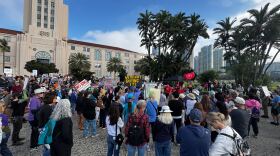Raila Odinga, the opposition leader in Kenya who cast himself as an agent of change and champion of the poor, looked likely to unseat incumbent President Mwai Kibaki.
Odinga, a flamboyant 62-year-old former political prisoner, was out front in the hotly contested presidential election based on an unofficial tally of the votes Friday. He represents the Orange Democratic Movement.
Thursday's election was the first in which an incumbent president has faced a credible challenge. Odinga was one of Kibaki's former Cabinet ministers.
It was also shaping up to be the closest presidential race in four decades of independence from Britain. However, the slow pace of official returns raised fears of vote-rigging.
Violence was a major concern in the run-up to the election. Several diplomats have expressed concern that a narrow victory on either side could lead to rioting by those who do not accept or trust the results. But the voting was generally orderly.
Violence often erupts at election time in Kenya to settle old land grievances between ethnic groups and also to dissuade people from voting. Kenya has 42 distinct ethnic groups — each with its own language and home territory — but no single group has enough votes to dominate the rest of the country.
Kibaki, 76, has been credited with helping boost this East African nation's economy, with a growth rate that is among the highest in Africa and a booming tourism industry. But his anti-graft campaign has largely been seen as a failure, and the country still struggles with tribalism and poverty.
Odinga's main constituency is Kibera, one of Africa's largest slums, a maze of potholed tracks and ramshackle dwellings that is home to at least 700,000 people. He is accused of failing to do enough to help his constituents during 15 years as a lawmaker.
Unofficial results reported by local media, taken from tallies at some polling centers, all put Odinga in the lead.
Nation media group, one of the media tallies, reported Odinga ahead with 56 percent of the vote and Kibaki with 37 percent after only 21 percent of votes were counted.
By Friday night, preliminary official results had been announced in only 29 of Kenya's 210 constituencies. Those counts showed Kibaki leading by 642,674 to 552,282; counting could stretch into Saturday.
To win, a presidential candidate has to get the most votes as well as garner at least 25 percent of votes in five of Kenya's eight provinces.
In Washington, State Department spokesman Tom Casey praised the high turnout, which electoral officials estimated to be about 70 percent of Kenya's 14 million registered voters.
"The basic mechanics of the election, so far, look to be fairly good," he said.
Police Commissioner Mohamed Hussein Ali on Friday tried to head off any potential violence after the results are announced, urging whoever wins "not to engage in unbridled celebrations that will cause resentment."
To the losers, he instructed, "take it with dignity."
At Nyayo Stadium in Nairobi, electoral officials checked the seals on ballot boxes and observers dozed on the concrete bleachers after spending the night listening to results come in.
If Kibaki loses, he will be Kenya's first sitting president ousted at the ballot box. Analysts say the chance of a second transfer of power in two elections shows how Kenya's democracy is thriving. Others, however, say it heightens the potential for trouble.
Kibaki won by a landslide in 2002, ending 24 years in power by Daniel arap Moi, who was constitutionally barred from extending his term. Moi's blanket use of patronage resulted in crippling mismanagement and a culture of corruption that plunged Kenya into an economic crisis.
Odinga was a political prisoner under Moi's regime.
Kenya's voters were also electing 210 members of parliament and more than 2,000 local councilors.
With additional reporting from The Associated Press
Copyright 2022 NPR. To see more, visit https://www.npr.org. 9(MDAzMjM2NDYzMDEyMzc1Njk5NjAxNzY3OQ001))






